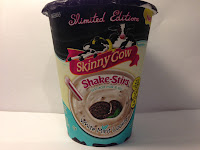In the past few weeks, I have begun to notice just how manipulated and unhealthy our society’s relationship with food is. Instead of focusing on fulfilling individual nutritional requirements and lifestyle needs, food providers take advantage of the guilt and anxiety they have instilled in consumers to sell their products. Having personally gone through phases of preoccupation with dieting, calorie counting, and/or obsessively exercising, I know just how mentally consuming and distressing the effects of having this kind of unhealthy relationship with food and exercise can be. To help prevent others from having to go through what I’ve gone through, I want to use this post to point out the bizarre and twisted ways in which people exposed to advertising are made to feel guilty about what they eat.
Furthermore,
while I would like to be able to say that the images and advertising campaigns
displayed below are not supported by well-conducted or accurately cited
scientific research, I cannot do so, for I am not a scientist, registered
dietician, nutritionist, or health professional. That being said, the
collection of images below is intended to make you realize how frequently and
subtly these messages are presented to you in your everyday life. While
viewing, think about how these messages that encourage blame, shame, and guilt
might have a significant effect on you.
Exhibit A:
This store brand repeatedly equates salt,
fat, and calorie consumption with wrongdoing.
Exhibit B:
The discussion of “Skinny,” reduced fat,
reduced calorie coffee drinks featured on this coffee provider’s official blog
suggest that skinny is special and exciting. At the same time, it also equates
ordering a regular drink with trying to gain weight (which, as you may
know, advertising and the media tend to view negatively.)
Exhibit C:
Skinny Cow brand frozen desserts first make
you feel like you’re a “cow” for consuming frozen dessert products, but
then save you with their wonderfully “healthy” options. They reassure you that
by buying their products, you will look like a sexy, thin, human version
of the cow displayed on their packages.
I hope that
reading this entry has increased your awareness of just how many negative
messages we are subtly bombarded with on a daily basis as well as how dramatic
an effect these messages may have on the way you feel about your body or what
you eat. While we may not be able to immediately change the way companies
label and advertise their products, realize that you, as an informed consumer,
have the choice to either pay attention to or ignore the messages that they
send. You have the ability to decide whether or not you will let these messages
affect you.
*Disclaimer:
Most company names and logos that originally appeared in the above images were
removed, for my intention here is not to criticize any specific organizations.
Rather, it is to create informed, empowered readers.







No comments:
Post a Comment